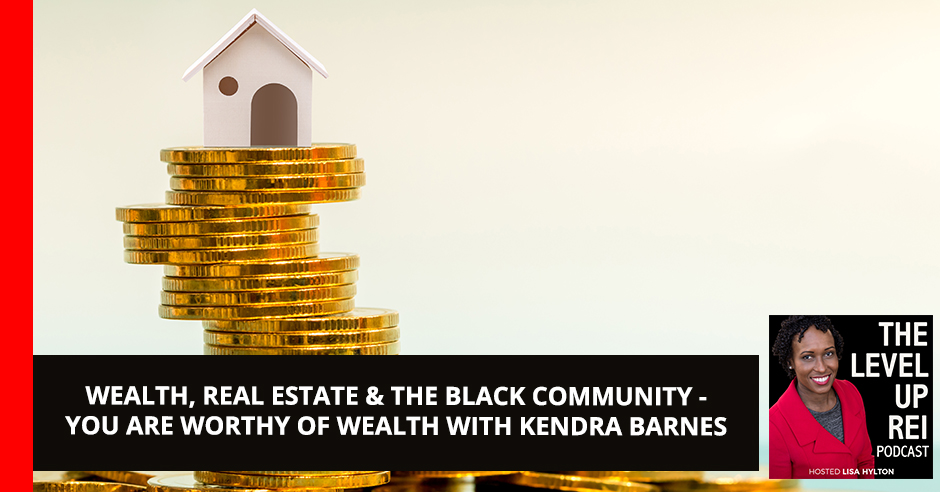
There are many different ways to invest in real estate, and they each have their pros and cons. On today’s show, Lisa Hylton brings on Kendra Barnes, the Founder and Creator of The Key Resource, an online platform and community that aims to help beginner real estate investors start or enhance their real estate journey. There are so many takeaways from this episode, which includes insights on how you can build your financial foundation, using first-time homebuyer programs and grants, strategies to get started in real estate, how to invest without a W2, and setting your mindset and having that affirmation that you are worthy of wealth! Ready to take the keys to your first property and start creating passive income? Then tune in and discover real estate investment tips that work!
—
Watch the episode here
Listen to the podcast here
Wealth, Real Estate & The Black Community – You Are Worthy Of Wealth With Kendra Barnes
I’m super excited for another episode in February 2021 celebrating the theme of wealth, real estate, and the black community. On our episode, I have an amazing guest. Her name is Kendra Barnes. She is a full-time real estate investor and Founder of The Key Resource. Her real estate investments afforded her the ability to retire from the 9:00 to 5:00 at the age of 32. She created The Key Resource to inspire, empower, and educate people about the power of homeownership and real estate investment. She owns and manages four properties, eight rental units, total. Welcome to the show, Kendra. I’m happy to have you.
Thank you for having me.
To get started, I want to dive into your story. You were able to retire off of real estate at the early age of 32. Many people are trying to live that. Right now, we are dealing with the stock market going up and down and crazy, it’s game stock, and all this other stuff. People are trying to get rich overnight. I want to start with how did you do that?
It didn’t happen overnight. People ask me all the time, “How many rental properties do I need to retire? How can I duplicate?” It’s so interesting because I always tell people, “The first thing you have to do is figure out what your financial freedom number is. How much do you personally need to live off of each month?” That’s where I started. I started figuring out, “How much rental income do I need to bring in to sustain my lifestyle personally?” My husband and I started calculating that number. We landed on a number and then we started working towards that. What’s unique about our situation is, when you read the bio, we don’t have a ton of rental properties. We don’t own dozens of properties.
I have friends who own 40, 50, 60 units and we only have eight. When we retired, we only had eight. That was in Washington, DC. If you’re familiar with those high costs of living areas like LA and DC, eight rental units in those areas are very different than owning eight rental units in Charlotte, North Carolina or Detroit. That’s one piece of the puzzle. One, starting to figure out what your financial freedom number is. Also, figuring out how many rental properties you would specifically need in the area you’re investing to get there. That’s how we started it.
When you started, your rental properties were in DC. Were you living in DC when you were buying those properties, perhaps at that time?
We live in San Antonio, Texas now but we did live in DC first. We lived there and that’s where our investing started. We lived there for a while and then moved to Texas. Just before the pandemic, we had a baby and wanted to be closer to family. We’re in San Antonio now but our properties are still out there.
Is this your first child?
If you have the resources and the funds to diversify, do a little bit of everything. Share on XYes.
Are you a first mom?
I tell people, “I left my 9:00 to 5:00, but I have a new boss now and she does not play any games. She’s very strict.”
How long ago did you leave? Are you and your husband both in the business of real estate full-time?
We both left our jobs within a few months of each other. We both worked for the government. He left first. It’s funny because I tried to turn my two weeks’ notice in when that government shut down happened a couple of years ago. I turned it in and then the government shut down the next day. It didn’t get processed. I forgot how long but it was weeks. When they finally reopened, they processed it and stuff, so it’s been about two years. The crazy thing is I was ready to quit. Way before that, we had reached our financial freedom number like three years before we left.
I was telling my husband like, “Let’s leave now.” I hated my 9:00 to 5:00. I’m glad that he’s more patient than I am because he’s like, “No. We need to wait and make sure that it’s sustainable because with real estate investing, there are ups and downs. You have a vacancy. You have tenants that may not pay. You have repairs that need to be made.” Even though we had started bringing in that level of rental income, it’s like, “Let’s weather a few storms first.” I was glad he did that but I’m like, “Let’s go.”
Diving deeper into that. You said that you hit your financial freedom number a few years before you decided to leave. Was that all through real estate or did you invest in things other than real estate?

Real Estate Investment: The different strategies real estate investing strategies really all boils down to how much time you have and how much money you have.
It was all through real estate. We didn’t start investing in stocks and things like that until after we left our 9:00 to 5:00 jobs. Now, my husband is big into day trading and swing trading. We were not in the stock market or anything like that. Strictly real estate and strictly buy and hold investments. We’ve never wholesaled. I’ve never flipped a property. None of those things. I’ve never invested in a REIT. I’m going to be investing in my first REIT in 2021.
What’s the motivation behind deciding to invest in your first REIT this 2021?
The numbers make sense and I want to have a diverse portfolio. The thing with REIT is it’s passive. I was looking at the numbers. I have this cashflow I want to attain. I want to make X amount of dollars per month with my next investment. I’m like, “If I put X amount of dollars in this REIT, I can reach that monthly goal that I have without the different things that come along with being a landlord but with being a landlord and owning the property, there are other benefits.” It’s six in one hand and half a dozen in the other but it’s good to have your hands in different buckets if you can. If you have the resources and funds to diversify and do a little bit of everything. We’re at that point now where we’re trying different things.
Can we talk a bit about your business, The Key Resource? Can you talk about why you decided to start your business?
When we first bought our third property, which was a four-unit property, I remember posting a picture on my personal Facebook like, “We bought this four-unit.” I said something like, “We didn’t do anything that you can’t do to get here,” or something like that. My inbox was flooded with messages from people that were like, “How did you guys do this? Did you rob a bank? Did you hit the lottery?” People were curious. I realized that there was nothing out there. There was a lack of representation saying like, “You can be young, black, and own multiple properties.” People literally thought the only way you could do that was to hit a lottery.
I need to show people that this girl right here did not grow up in a wealthy family, did not hit the lottery, or rob a bank, for that matter. I didn’t always have good money habits either but you can be all of these things. First-generation or whatever in your family and still be able to buy real estate. I was like, “I need to go and start teaching people what I know and be what I needed,” because no one showed us the way. We made mistakes in the beginning and stuff like that. I’m like, “There’s no reason that anyone who comes across me or comes across my page will make the same mistakes that I did. Let me lift as I climb.” That’s how it started.
A lot of stuff to dive into there. The theme of the show is wealth, real estate and the black community. As black women and for yourself, you have your business, The Key Resource, how do people get the financial foundation they need to put in place to then be in a position to invest? Could you start with the financial foundation that you and your husband put into place that enabled you guys to then build on that foundation through investing in real estate?
Savings and credit is important. That’s something I wish I would’ve known way earlier on. Thankfully, my husband had excellent credit. When we started buying properties together and getting mortgages, that helped. His credit was good but mine wasn’t that great because no one told me how your credit score follows you and how that impacts you for years to come. I always joke that I had this J Crew credit card way back in the day and I was living beyond my means. I was paying bills late and all these crazy things. When we got that very first mortgage for our first house, the interest rate that we got on that mortgage was based on, in part, my credit score. It was those bad decisions I had made years ago but no one ever told me like, “Kendra, when you get a mortgage, these are the things they look for.”
Your credit score follows you and impacts you for years to come. Share on XIt seems simple now. I’m literally still paying for those J Crew clothes from my early twenties and that mortgage that we have. We still have the mortgage to this day because we rent that property out now. I’m like, “You’re going to have to bury me in this J Crew clothes because they’re the most expensive clothes that I ever purchased.” Things like savings and credit are definitely important and using your first-time home buyer status to the best of your ability. One thing I also didn’t know was about the first-time homebuyer programs out there, grants and down payment assistance programs that can help eliminate that hurdle of the down payment. That’s where people get stuck right there. It’s like, “I can’t buy a house. I’ve got student loans. I can’t pay for this down payment.” Those are a few things that I wish I had known.
Where’s the best place people can go to find out, especially about those home buyer programs, grants, and that stuff?
I have a list on my site that I’ve put together. If you go to TheKeyResource.com/downpayment, I’ve put it together for about twenty-something states, but also Redfin has a list as well by state. You can check those out too.
That covers the foundation. Once you get the foundation down, the next part is strategy. As people are thinking about investing in real estate, you pointed out that you focus on buying and holding but there are many other ways like wholesaling, flipping, and etc. Could you talk about how you might help people understanding what path works best for them?
If you think about the different strategies, flipping, buying and hold, wholesaling, tax liens, REITs, and being a private lender, it all boils down to how much time and money you have. One of my friends says this all the time and it’s brilliant, “To invest in real estate, you need time, knowledge, and money but you don’t personally have to have all three. You might have the time and the knowledge but not the money and you can team up with someone who does. You might have the money and the knowledge, not the time. You need those three things but if you don’t personally have all three, you can still get started.” Let’s say for instance, wholesaling. That is a strategy that doesn’t require you to have any funds per se.
You can basically get started with no money and bad credit but you need lots of time to wholesale. If you don’t have a lot of time, wholesaling is probably not for you. With buy and hold, it depends on how you buy and hold. You’re going to need relatively a good sum of money to put it for a down payment unless you’re house hacking or something like that. Flipping has been glorified with TV. People think it’s easy. You can make a lot of money in a relatively short amount of time but you’ve got to know your stuff. It boils down to figuring out how much time and resources you have and how hands-on you want to be because real estate investing is referred to as passive income. It’s not always passive. There is some work required upfront and then once you get things set in place, then it can be a passive stream.
Can we move into some of the mistakes that you guys have made or mistakes that you’ve seen people who are getting started in the process making?

Real Estate Investment: Use your 9 to 5 income to the best of your ability before you leave, if you want to leave.
One of the biggest mistakes we made was not house hacking when we had the chance. If you’re reading and you’re not familiar with house hacking, it’s buying a multiunit building, living in one unit, and then renting out the others. There are many benefits. One being that if you live in that multiunit property, you no longer have to put down this huge down payment that you would have had to put down. If it was a rental, you’re now able to put down much less because you’re inhabiting it as your primary residence. Also, the benefit of house hacking is you’re living in a building for free if the numbers work out. Think like you’re living in the building for free and your tenants could be covering the mortgage with that rental income.
Our first rental property was a duplex. We didn’t know about house hacking but even if we did, I wasn’t even in that wealth-building mindset where I was okay with sacrificing. We had this big house that we were living in and we had all these comforts and things that I wouldn’t have wanted to give up because I was like, “I work hard every day. I’ve got a Bachelor’s and a Master’s Degree. I’m not going to go live in some tiny apartment.” What I know now is to build wealth, you have to be able to make those short-term sacrifices. We ended up house hacking later and downsizing, but that’s a big mistake that I feel we made. It’s not taking advantage of house hacking first. The other thing that I see other people make a mistake is not positioning themselves to pivot.
When you’re thinking about having a rental property, people buy a property and they’re like, “I’m going to put this on Airbnb. It’s going to make all this money.” It might because Airbnb is a great strategy but what if it doesn’t. Before you buy a property, running the numbers on strictly one stream of rental income, you need to run the numbers on other strategies as well to make sure it still makes sense. What if Airbnb doesn’t work out? Are you still going to be profitable if you have to rent to Section 8? Are you still going to be profitable if you rent to travel nurses or if you rent to students? Make sure that you are positioned to pivot and know the area that you’re buying that rental in. What’s coming down the road? What kind of developments? That’s a huge thing that people miss.
Those are good stuff here that we covered. Specifically for the black community, for someone who is an African-American or a black person who is a professional, a student, getting ready to start working, or they’ve been working for a couple of years, the advice to both of those groups are going to be slightly different, but starting with the professional. What advice would you give to professionals who are reading who are working in Corporate America and would love to be able to create multiple streams of income through real estate? They’re maybe struggling with taking that jump. They live in a market that’s super expensive like Los Angeles, DC, or one of those expensive cities. What advice would you give to them as they think about investing in real estate?
We live in this era where leaving your 9:00 to 5:00 is glorified on social media. I have left my 9:00 to 5:00 and I tell my story. Honestly, I always knew I wasn’t cut out for 9:00 to 5:00, even back in grad school but that’s a whole other story. First, if you love your job, that is okay. Just because everyone is being entrepreneurial on Instagram, you don’t have to be but also think about it like this. Getting a mortgage and getting a loan for a property without a 9:00 to 5:00 is very hard. Take it from someone who no longer has one. Even with all of our cashflow and all of our assets, it is harder and more expensive for us to get a loan, a traditional mortgage.
Use that 9:00 to 5:00 income to the best of your ability before you leave if you want to leave. Use that W-2 income. That’s going to be your first investor. That check is your first investor into your real estate dreams. If you don’t want to leave your 9:00 to 5:00, you can also be a real estate investor and work full-time. You don’t have to do this full-time. You don’t have to have dozens of rental properties. Just own something. Don’t get in that comparison trap. That’s for the people who are starting out in their careers. For black people that are in our community, real estate investing is being talked about more, which I’m excited about.
We’re seeing this new wave of ownership, stocks, real estate, and businesses. I am here for it. Because it’s now starting to be talked about, there’s this generational void where older generations, and I experienced this in my family, people are like, “Why don’t you work and retire? You’re too young. You haven’t even paid your dues yet. You are doing too much.” It’s the ideas that are different from generation-to-generation. Don’t let other people limit you based on their fears. Don’t let them project their fears on you and limit you because I’ve experienced it. It’s often the people closest to you like your friends and family who won’t get it and that’s okay.
You can make a lot of money in a relatively short amount of time, but you got to know your stuff. Share on XKeep going and they may get on board later. You may inspire them. What I’ve seen is even with my own parents, they’re fearful of it because they weren’t real estate investors themselves or it seems risky that they want to protect us. They’re trying to project all these different fears. Now that I’m a mom, I do get it a little more. I’m like, “They’re in that protection mode.” Especially since it wasn’t something that was taught. This is new for us. I would say keep going.
That’s some good advice because I have experienced the fears. You have your own internal fear and then if you’re around other people who feed those fears, you will be going nowhere soon. You have to guard that mind for sure. You noted that for people who leave their W-2, it gets a little bit challenging to get loans. Can you talk about how you guys navigate that personally or how you advise other people who are entrepreneurial to navigate purchasing real estate when they don’t have that W-2 income?
There are lenders that have what are called bank statement loans where they look at the cashflow coming into your business and they’ll use that. The interest rates can tend to be a little higher. You probably will have to put more money down. If you’re an entrepreneur, you need to keep meticulous records. You’re going to need to have your tax filings for your business like the last two years of tax statements for your business. You’re going to need to have some cash on hand. It’s not going to be easy but it is totally doable.
You can also think about trying to get private investors. If you have friends or family, or if you go to a real estate meetup meeting and you meet investors there that have the money that can invest, then you can skip the banks and get private investors. You can also look for seller financing deals where the seller of the property is acting as the bank. Those are ways to get around that red tape that the bank will put you through for being self-employed. Those are some tips for entrepreneurs.
I appreciate you coming on the show. Anything else that you would like to leave with my audience given the theme of this episode being building wealth, real estate, and the black community.
Mindset is big. I always say start with this affirmation that you are worthy of wealth because that’s also something that’s like, “Little old me.” I can own real estate even though I have all these issues and my family has all these things. You are worthy of it. You can start with what you have right now. People think that building wealth or buying real estate, you have to be wealthy first. No, it’s not a prerequisite. Wealth is a by-product of real estate investing, investing in stocks, businesses, or whatever you invest in. You don’t have to be wealthy first. I’m reading this book right now called The Big Leap. I want to shout from the rooftops and gift this book to everyone I know because it’s about that mindset and about believing that you are worth abundance. That’s the key. We limit ourselves way too much. That’s one thing I want to leave everyone with.
Thank you so much. At this point in the show are my level up questions that I ask all my guests. The first one is, what are you grateful for in your life now?

Real Estate Investment: Wealth is a by-product of real estate investing or investing in stocks or businesses or whatever you invest in. It’s not a prerequisite.
I’m grateful for health.
I know 2020 has been one hell of a year, COVID and the whole nine yards. Health is super important. What would you say has attributed to your success and continuous growth?
I’m not afraid to bet on myself. There’s no losing, only lessons.
What do you know now that you wish you knew at the beginning of your journey?
I wish I had known about leveraging different resources, grants, down payment assistance, things like that.
Can you talk a little bit again on The Key Resource and what are the key things that people can receive from engaging with your business?
You guys can find me on Instagram, @TheKeyResource. Once you find me there, everything you need is right in the link in my bio but I post lots of tips and behind the scenes. You can look to find inspiration, encouragement and empowerment there. I also have a membership program called The First Time Home Buyer’s Society. It’s for anyone who’s buying their first home or rental. It’s a weekly group coaching program. That’s how I coach, mentor, and connect with people through that membership program.
I like that, The First Time Home Buyer’s Society. When you’re in a community of people, it helps you to go further in your journey and it supports you in ways that if you’re doing it by yourself, it’s completely different. Thank you so much for coming on the show, Kendra. I appreciate it.
Thanks for having me. It was fun.
—
Thank you again, Kendra, for coming on the show. I appreciate it. It’s such an amazing episode. Here are my key takeaways from this episode. Number one, your financial foundations consist of the following three things. One, savings. You need to have good savings. That’s emergency fund. Number two, credit. Make sure that you are doing your best to keep your credit clean. Number three, using first time home buyer programs and grants. We talked about strategies to get into real estate.
We noted that there are three things that are needed in getting into real estate. First, time, money and knowledge. Note, you don’t need to have all three of them but you are going to need to bring one of them to the table. You can partner with other people who are coming with the other resources or skills accordingly. The second thing was the mistakes. She noted two mistakes and then talked about a few ways in which to mitigate these mistakes. The first mistake she talked about was not house hacking when they had a chance.
She noted that one of the benefits of house hacking when they eventually did it was the low down payment. Secondly, you have the ability to live for free because you have your tenants who are able to potentially pay the majority of the expenses. The second mistake is not positioning yourself to pivot. This was in relation to buying real estate investments. For instance, she noted as an example, people are buying a property for the purpose of Airbnb-ing but not considering that there might be a change in the market. In other words, running different scenarios.
If you’re buying a property for Airbnb, run the scenario. Suppose you had to buy and hold it and put a tenant on it for a one-year lease. Would that still work? Being able to have the different scenarios and know that you have different exit points or different ways in which you can make money with this particular property. The second thing that she noted connected to not positioning yourself to pivot is understanding the market that you’re buying your property in. To understand what are the trends, some of the developments and things that are going on. Some of the different options you have in terms of bringing in income, either it’s Airbnb, long-term rentals or whatever it is as well as selling.
Another item that I thought was a great key takeaway was about an entrepreneur is interested in investing without a W-2. Four things were having good records, good bookkeeping, having cash on hand was number two, and then private investors was number three. That rolls into syndications or JV-ing, for instance. Lastly, looking for seller financing deals. There are always opportunities. She also mentioned that they are lenders with bank statement loans which look at your cashflow and the interest rates would be slightly higher on those types of loans. Lastly, what I totally enjoyed is she noted that what holds a lot of people back is mindset. The affirmation of, you are worthy of wealth.
On that, I want to leave you with that affirmation, “You are worthy of wealth.” It’s an amazing episode. Those were my key takeaways. If you haven’t checked out my website, www.LisaHylton.com, please go by there and check it out. If you are interested in passive investment opportunities and want to learn more about how that whole process works, on my website, I have a free seven-day course called Passive Investing Made Easy. It’s seven-day series. Go on there. Sign up for it to learn more about how the process works. In there, there’s also an opportunity to get on my calendar and let’s talk about how we can help you get real great passive opportunities to build your wealth going forward. Until next time, guys. Enjoy the show and keep leveling up.
Important Links:
- The Key Resource
- TheKeyResource.com/downpayment
- Redfin
- The Big Leap
- @TheKeyResource
- The First Time Home Buyer’s Society
- Passive Investing Made Easy
- https://www.amazon.com/s?k=big+leap+audible&gclid=CjwKCAiAsOmABhAwEiwAEBR0Zu7E2VAnrL9iuGMJpNDvEIGLWXFnEmupfNbLgD2Tghsv_fgWodmhpRoCxfgQAvD_BwE&hvadid=322373920524&hvdev=c&hvlocphy=9031003&hvnetw=g&hvqmt=b&hvrand=16202941683403989187&hvtargid=kwd-669454517893&hydadcr=20338_10163971&tag=googhydr-20&ref=pd_sl_3zsjnm2u6t_b
About Kendra Barnes
 Kendra Barnes is a full-time Real Estate Investor and founder of The Key Resource. Her real estate investments afforded her the ability to retire from the 9-5 life at the age of 32.
Kendra Barnes is a full-time Real Estate Investor and founder of The Key Resource. Her real estate investments afforded her the ability to retire from the 9-5 life at the age of 32.
She created The Key Resource to inspire, empower and educate people about the power of homeownership and Real Estate investment.
She currently owns and manages 4 properties (8 rental units total).
Love the show? Subscribe, rate, review, and share!
Join The Level Up REI Podcast Community today:

Recent Comments